
Why All Diets Fail And Why You Don’t Need a Diet to Lose Weight (The Secret Sauce of Success)
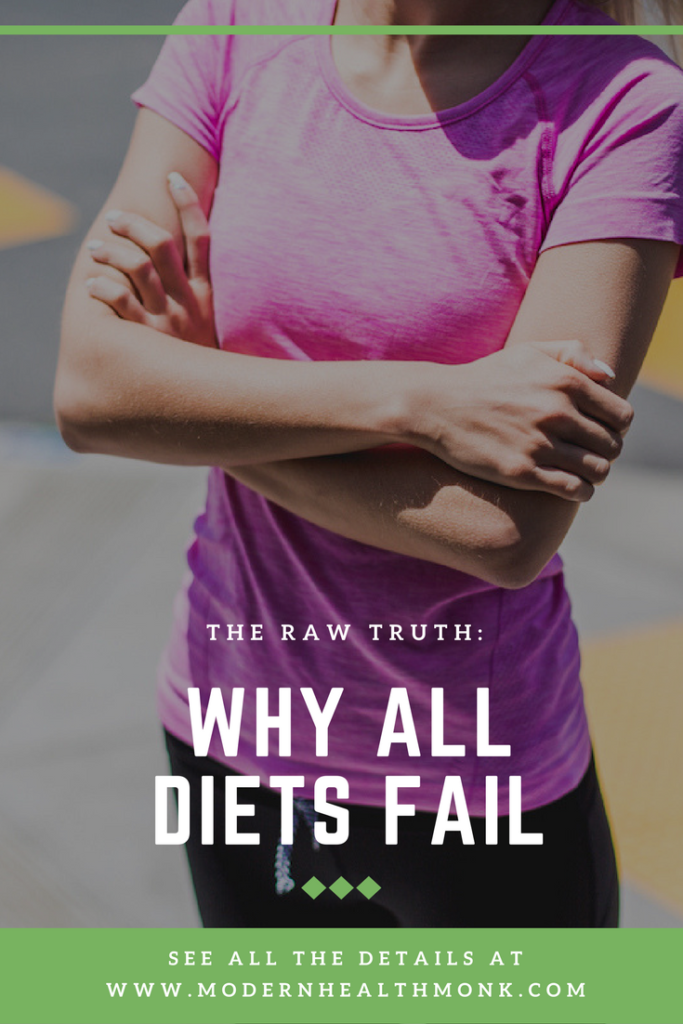
Do all these new diets ever bug the crap out of you? It seems like there’s a new diet every week (I think statistically speaking there’s a new one every few weeks.)
Just last week I was in Barnes and Noble and saw half a dozen new diets on the shelf — most were some kind of re-purposed Atkins, Paleo, or Gluten-free diet, but some were new.
But to me it’s not really surprising that modern consumers have no clue who to trust in the health & wellness space. A new diet every month. A new guru every month. Sites like Bodybuilding.com geared towards bodybuilders but actually in the business of pushing supplements (that often do nothing) on customers.
And these are all marketed towards people that have the same hope: the belief in quick fixes. New guide? Maybe it’ll have something the others don’t. New supplement? Maybe it’s a revolutionary new uber-antioxidant from a pillaged rain forest in South America.
So who do you trust? The story almost always ends up the same when I hear it from people:
“I have no idea who to trust anymore, so I give up, I’m just going to eat what I like, enjoy my life, and stop stressing over it.”
Sound familiar?
To top off the frustration, It doesn’t matter which diet you choose because most people can’t stick to any diet.
I don’t blame anyone for not wanting to invest time into figuring out what’s healthy and unhealthy, what gives you cancer, and what makes you live forever. It’s incredibly frustrating.
And that’s why I want to draw your attention to one key fact today:
Research has shown that whether you stick to your diet is more important than which diet you stick to.
So I’m going to go out on a limb here and tell you something you already know – you can’t lose weight, get fit, or fix chronic pain without creating proper habits and then sticking to them.
But there’s another problem: most of us don’t think we have the willpower to force these new habits, force ourselves to go to the gym, force ourselves to stop drinking soda, or force ourselves to start cooking every meal every day.
Fortunately, it’s not about willpower or forcing it.
Why willpower is ineffective and why you don’t need it to stick with good habits
For a long time people talked about willpower and assumed it to be the “defining” quality of the successful. Discipline. Grit. Fortitude.
Whether you were a successful businessman, superfit with an insanely non-existent sweet tooth, or someone who just seemed to be successful in everything they did – people assumed it was because of willpower and discipline.
Discipline. God I hate that word — and I bet you do too right?
Because we assume that all people that have gotten somewhere in life or managed to turn their health around are gods and goddesses of willpower and discipline that just forced themselves to do more things they hate. And that led to their success.
Except it’s not really true. Not always, anyways.
A few years ago, someone asked me how I adhered to such a strict diet of almost no-sweets. I told them “I just do it” which I now realized wasn’t very useful advice for someone wanting to change their habits for the better.
I just assumed that I was born with more willpower and discipline than most people.
Research shows willpower to function like a muscle that has limited power especially as the day goes on. So were those people “born” without willpower and discipline out of luck? Are they doomed to a life of mediocrity and frail health?
Not at all.
Years later I realized that this was a massively wrong assumption. Willpower is actually not quite as constant and as “built-in” as one might think. Many complex factors affect the strength of your willpower on a daily basis – sleep (and lack of), stress and nutrition to name a few.
So willpower is not exactly the most reliable way to maintain a health and fitness regime or get started. It’s too variable. And health is something that has to be a priority — so you can’t rely upon something as variable as willpower to keep you healthy.
That’s when I there was a much better “secret.”
The secret was, in fact, habits.
Why your new year’s resolutions always fail
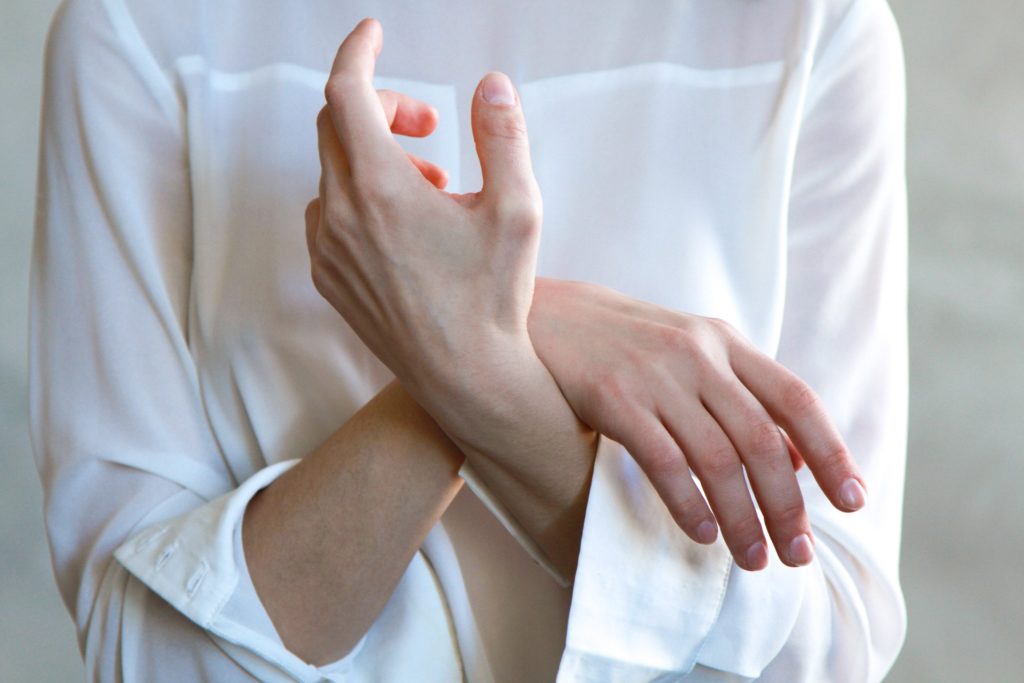
I’m going to tell you something you may love or hate me for: You don’t fail to stick with your new year’s resolution because of lack of willpower or lack of discipline. You’re not lazy, you’re not “unmotivated,” you just have no idea about how much of your life (and your “success”) is governed by your habits.
“We are what we repeatedly do. Excellence, then, is not an act, but a habit.”
– Aristotle
Everything about you – success, health, happiness, prejudices, friends, aspirations, outlook on life – is all because of habits and patterns of habitual thinking and acting.
Really. You are born with certain things, your environment causes certain things, your life experiences cause certain things – and all of these ingrain certain patterns in your brain.
The cool thing is that just about anything can be un-done (or changed for the better), and the field of neuroplasticity (literally – moldable brain) has shown us that the brain can literally, physically, be re-wired to accomodate new habits and new ways of thinking.
That’s good news for you. Whether you want to finally lose some weight on a diet that actually works, get bigger and gain muscle, or simply start waking up early and meditating, or just be a better spouse — you can do it as long as you understand the nature of habits.
The Science Behind Habits
When you wake up, do you take a shower and then brush your teeth, or brush your teeth and then take a shower? Habits.
When you get stuck, bored or frustrated at work, do you hop outside for a quick smoke break? Habits.
Late at night, after you’ve been watching some TV close to bedtime, do you crave one last sweet thing? Habits.
When you get into a fight with your spouse – do you remain calm and stay relaxed, or explode and get defensive and tense? Habits!
As it turns out, habits are created in a three step process:
- Cue
- Routine
- Reward
The cue is whatever sets off the behavior and triggers it. For the smoker, they might be sitting at work around 3 pm when they start getting really bored. They feel like they can’t concentrate and need a break. They feel agitated and need to do something. That’s the cue.
So what does the smoker do? She gets up and goes for for a smoke break and takes a little walk / de-stress session outside. That’s the routine.
As a result, she feels relaxed and much more calm than before. That’s the reward.
Here’s another example many of you are probably familiar with: Compulsive texting / emailing.
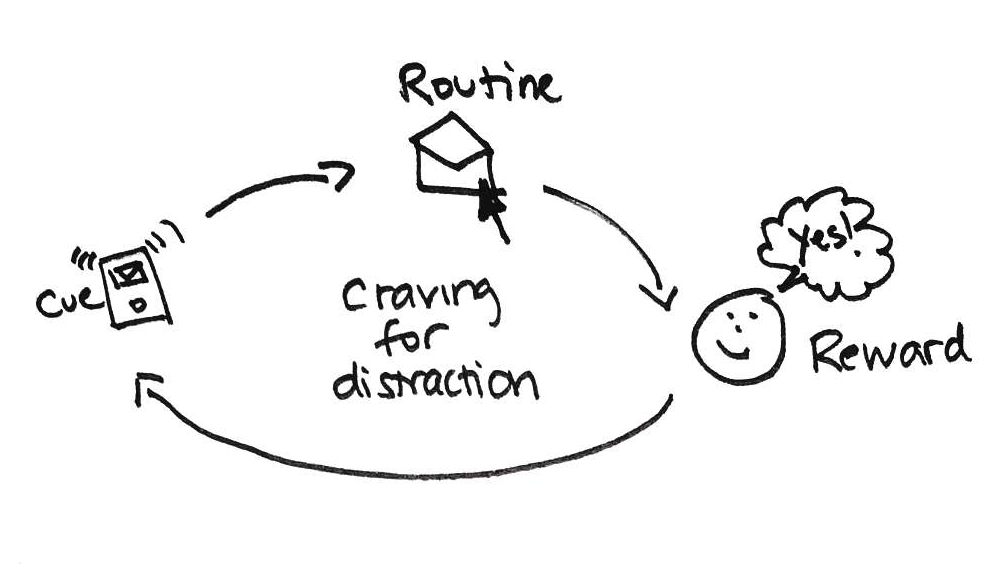
As a habit that many of us are all too familiar with, it goes something like this: We see the text or email on our phone , we see the blinking light, or the vibration, or the notification, and then we have the craving to open the message or check our email. For many of us, we can ignore it a little bit.
But then more and more messages come and the craving becomes stronger. We can’t ignore it any longer and we have to check the phone even if it’s under the table.
Here, the cue is the notification that you have a message coming through. The behavior is that you check your text message or email. And the reward is that you get relief/satisfaction that you’ve checked the message and no longer are curious what it’s about.
How do you break the habit in this case? One way is to turn off the cue. So instead of letting your phone notify you of incoming messages, you turn off the notifications and put your phone out of site. No cue ==> no behavior. The cycle is broken.
So what exactly does this imply for dieters or people who can’t stick to diets no matter what?
How to start (effortless) health and fitness habits, and break bad ones
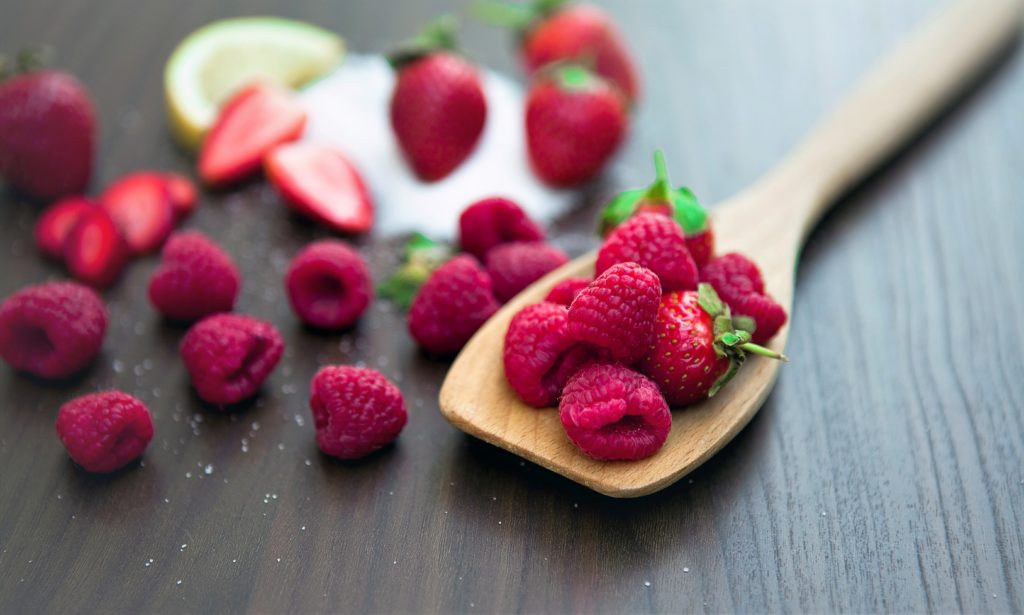
Here’s the part you’ve been waiting for.
Ultimately all this talk about diets and willpower had the purpose of discouraging using willpower and discipline (because they take so much effort – and likely are unsustainable for most of us), and encouraging the formation of good habits (which become effortless).
It’s much more likely that you’ll stick with something that takes less effort than something that is a constant struggle every day.
So let me go through a couple examples of putting this habit stuff to work in a couple situations.
“Eat Your Veggies, Honey!”
Did anyone else hate hearing that as a kid? I was pretty much a typical kid that would have preferred chicken nuggets every night over broccoli, but was forced to shovel in mouthful after mouthful of broccoli. Interesting fact: to this day I usually eat my vegetables first because I was used to shoving them down my throat and getting rid of the bad stuff first.
Most of us know that dietary changes will make up 80%+ of your results, when it comes to changing your body. Whether that’s for people who are losing weight, or skinny folks trying to gain muscle — diet controls almost all of your success, which is why you should devote a disproportionate amount of time to fixing your dietary habits first.
In college, I had a roommate that drank 8 (or more) cans of Coke per day.
Obviously, he was obese. He also experienced such severe caffeine withdrawal if he lowered the “dose” that he was physiologically hooked on soda like any smoker is hooked on nicotine.
One thing I noticed was that he stashed his coke right next to the computer — and everytime he was casually using his computer or playing a video game, he would (almost unconsciously) reach for a coke and crack it open.
———————
For a lot of people, consuming the “wrong foods” happens like any other habit — with a cue or trigger of some sort (Even if that means boredom). For my roommate, that cue was using the computer and playing video games. So let’s take a look at the habit formation cycle again and see how we might go about fixing my college roommate’s habits.
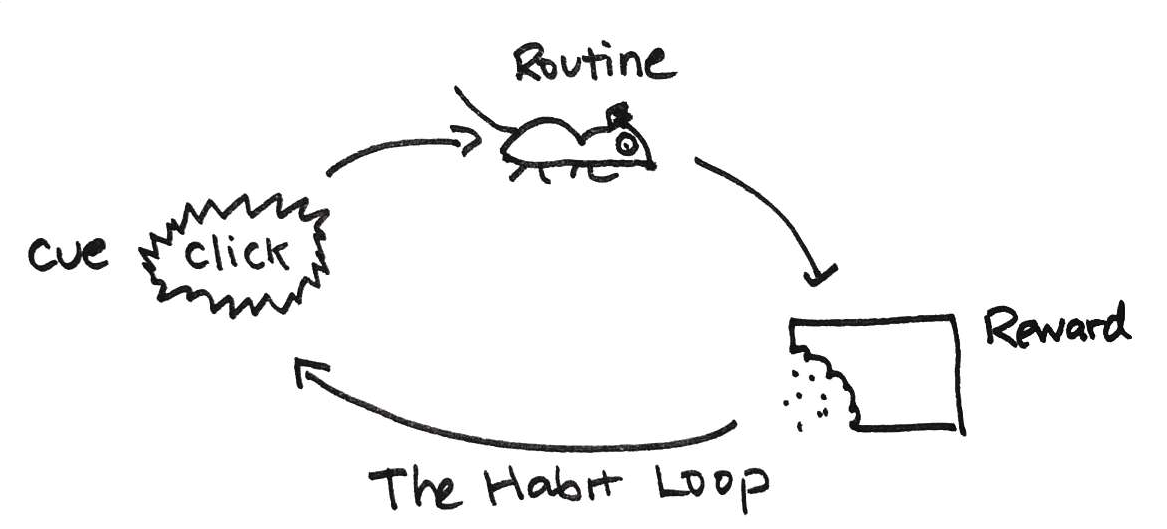
Cue: Using the computer, feeling a bit sleepy and bored
Behavior: Drink 1 (or more) Coca Cola
Reward: Tastes good, wake up a bit, stimulation
The key to breaking habits lies in a few principles (for now we’ll just talk about breaking bad habits), known as the Golden Rule of Habit Change:
- Keep the same cue
- Change the behavior / routine
- Keep the same reward
Here’s one of the rules about habits: you can’t totally eliminate a bad habit. It still leaves those neural patterns in your brain, so you have to change the routine instead and replace it. Otherwise it’s easily to fall back into the old habit
Bad habits cannot totally be eliminated – but they can be replaced with some new kind of non-damaging routine.
The thing about fixing all of these habits is that you need to really think about why you are doing the activity. In other words, was my roomate drinking coke while he played the computer because A) He was tired and needed caffeine B) He just wanted some flavor in his mouth or C) He was bored and wanted to do something?
Let’s talk specifics:
Example #1: My roommate wants to stop drinking so much soda every time he plays his computer.
First we need to think about what sets off the cue. Is the computer use the key ingredient? We probe further and learn that my roomate uses his computer a lot, but only at a certain time of the day does he drink the soda.
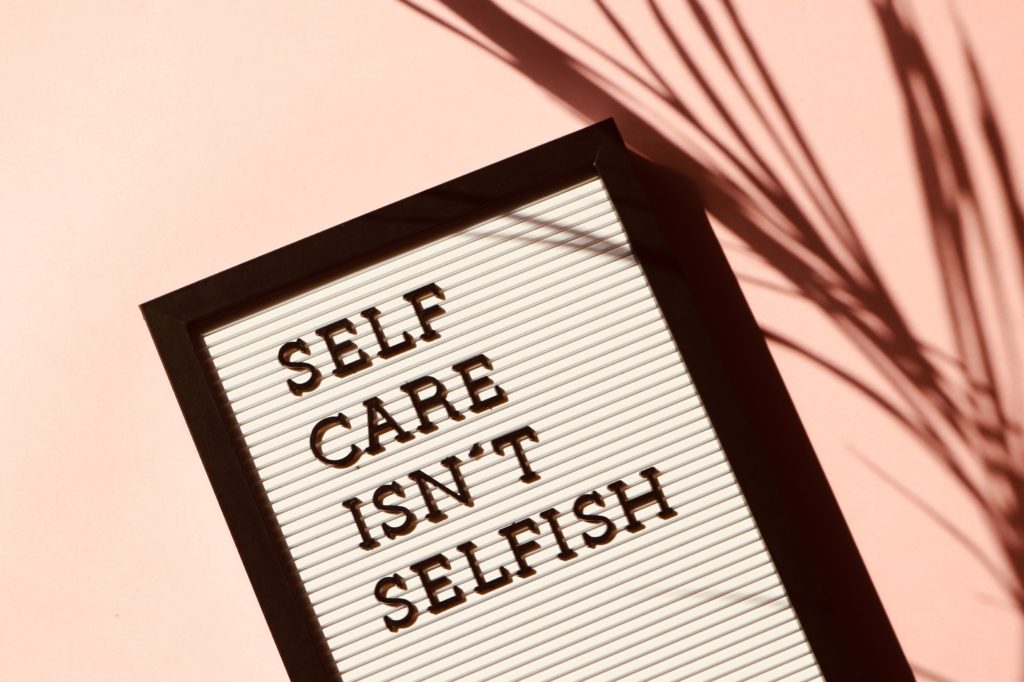
So we ask more questions, and we learn that my roomate is both bored and tired. So he wants an activity for his boredom, and for the afternoon slump he needs the caffeine. Bingo. We know the cue.
Now we go to the behavior. We don’t want him drinking soda, so what do we do? We know we need the same result — he needs to be not bored, and he needs something to wake himself up. So what behaviors could we substitute?
He could walk to his friend’s apartment, go grab a cup of coffee, head to the gym, or just walk around campus for a quick breather.
Now remember the golden rule — if you have a bad habit you want to change, keep the cue the same, and keep the reward the same, just change the behavior.
So now my roommate’s cue is the same — the afternoon when he sits down by the computer and he feels a bit bored and tired.
His routine is different – he decided to go walk over to his friend’s apartment for an hour.
But the reward is the same — he feels a little bit more energized, and he has something to do.
Example #2: I want to stop having my afternoon sweets at work everyday.
This is an example I think will resonate with a lot of people. Let’s face it, the majority of us are in jobs we aren’t exactly crazy about. That leads to a lot of boredom and repetitive stuff happening throughout the day.
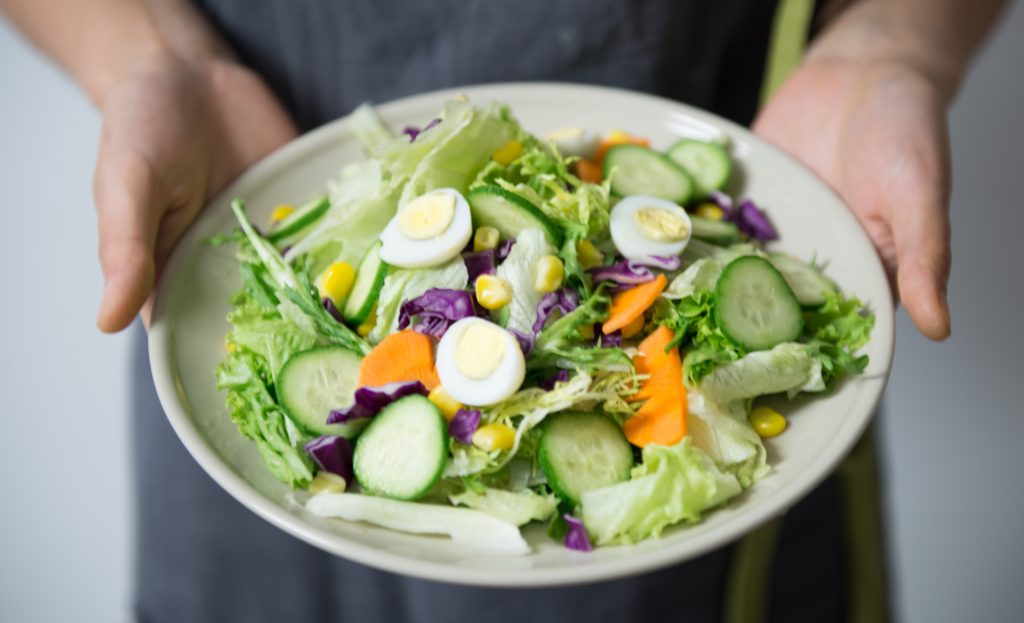
That leads to one craving in particular – the craving for stimulation – to do something.
One of my first jobs was in a high school, and I noticed that at about 12:45 every day, two periods before the working day ended for me, I got extremely bored and took a stroll up to the cafeteria to get a cookie. After a while this led to a craving for my afternoon sweets that I needed every day to stay sane, almost like the afternoon coffee many people rely on.
If this sounds like you, here’s an example of how we’d go about breaking this cycle:
- What’s the cue, and why are you doing it? Dig deep, and realize, that many of you aren’t craving sweets, you are just craving mental and physical activity. You’re bored (especially at work).
- What’s the routine? Eating a cookie.
- What’s the reward? Feeling like you’ve done something (craving for stimulation), as well as tasting something sweet.
So how do you go about breaking this afternoon cookie (or coffee) habit at work?
Keeping the golden rule in mind, we keep the cue and the reward, and change the behavior. We know that I was doing this because I was bored as hell at work — so now we change the routine and put in something else.
Instead, I could A) Go for a quick drive around the block, B) Stop by the faculty room and have a chat with some people, C) Grab a magazine/book and start reading, D) Start taking my lunch later, timing it around the moment of my peak boredom.
So now, the new habit cycle looks like this: Cue — feeling anxious, bored around 12:45, Routine: Go take my lunch (instead of earlier in the day), Reward: Feeling like I’ve done something, feeling stimulated.
Example #3: I want to stop drinking 5 cups of coffee at day at work.
Let’s look at one last example for now. I want to stop drinking 5 cups of coffee a day at work. How do I manage to do that? First, you don’t try to stop all 5 cups of coffee, you cut down by 1 cup a day.
Then, we go into our habit cycle:
- What’s the cue? Remember to dig deep for the why — and we learn that I have mentally associated coffee with work. As soon as I brew a fresh cup, I sit down and become super productive. It signals work time.
- What’s the routine — I drink a coffee, sit down and become super productive
- What’s the reward? – A feeling of satisfaction, completion, productivity
Going back to the golden rule, we remember we only need to change the routine to replace this bad habit with a good one. In this case, the person has mentally associated coffee (NOT the caffeine “high”) with productivity and doing work.
We need to replace this habit with some other signal that gets me in the zone, which could be a number of things:
- An online timer, like E.ggtimer which will give a loud alert that it’s time to start (Work time!)
- Another beverage, like tea, orange juice, or cold water
- Some kind of ritual that the person creates — like clearing the entire desk, setting down a cloth or mat on the desk, and whipping out the to-do list. This 3 part routine could instead become “the cue” that coffee provides.
Now our cue is still the same — Something needed to be associated with getting work started.
The routine is different — This time, I decide to set a loud E.ggtimer alert to signal when it’s time to get work started.
And the reward is the same — Work gets started quickly, and a sense of accomplishment is felt after being productive.
Many bad habits start due to boredom — here’s how to fight it
It’s interesting that in the peak era of distraction, so many people complain of boredom, and so many bad habits begin in boredom (compulsive texting, tv watching, constant snacking, internet use, etc.).
I won’t go into any specific examples here just for the sake of not writing a book — but you need to understand that in boredom, the craving is for stimulation of the senses.
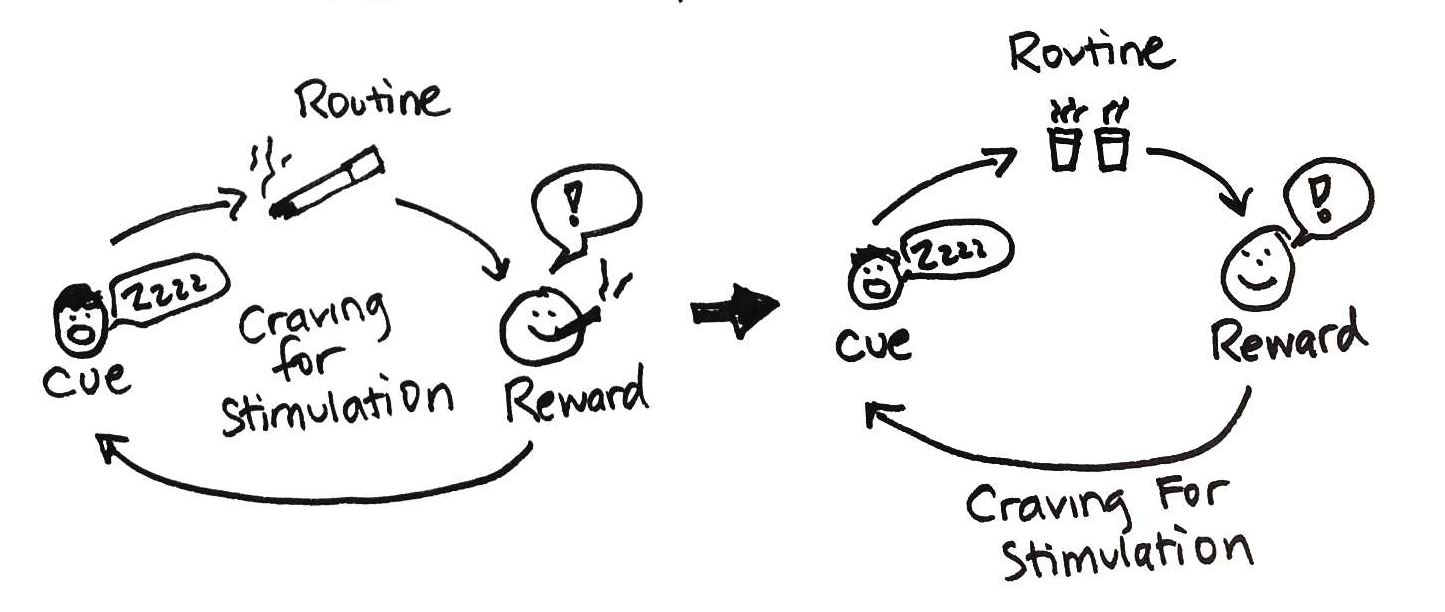
I’ve witnessed many friends take up smoking due to boredom at work or school. And I’ve witnessed an equal amount of friends do the same with sweets.
It all starts with awareness — if you’re working on a massive project, and you reach the point of no return when your eyes are glazed over and you stare out the window every 5 minutes, what does that mean? Do you need a cigarette or a cookie? No, you need to take a break.
But many of us don’t realize this because we’re not present throughout the day. So we mistake that for a cigarette craving, or we crave the physical break that a cigarette break provides.
One way you can observe the “craving for stimulation” in action is to carry around an index card. Every time you you reach for your phone while watching TV (when you don’t have a notification), or walk to the fridge (and forget why you went), or random open the internet for no good reason, mark an X on the index card.
You’ll start to realize how much of this so-called ADD is due to lack of engagement with what you’re currently doing. Imagine how many bad habits you are potentially forming without even realizing it?
The key is to stop for a second and say “Hey, I’m reaching for my cell phone because I’m bored, not because I actually want to use it or text someone. So what can I do for stimulation instead that’s actually contributing something to my life?”
The same is true when you walk to the fridge and don’t even realize why you went. Many of us just casually walk over, open the fridge doors, and stare for 30 seconds before wondering why we even went. Habits needs to all start with awareness. Understand that you’re bored (not hungry), and get out of the house.
Kicking bad habits and getting sexy — effortlessly
Forget willpower and discipline. They take far too much effort. And most things that take you a ton of effort have a much lower life expectancy than things you just want to do that are easy or effortless.
Instead, focus on the effortless power of habits — healthy eating, after all, becomes just another routine after a while. On a weekly basis I eat zero sweets and watch zero TV. Yes, not even an hour. Do I have massive willpower or discipline? People still wrongly assume that.
But I know that this is merely how I’ve mentally wired my brain – it’s a habit to not even stop foot in a room with a Tv. It’s a habit to not even go near the junk food isles in grocery stores. It’s a habit to cook all my own food.
I really feel like this is the “secret sauce of success” — imagine how different your health would look in a year of fixing 1 habit a month.
Imagine what your life would look like.
Sources from this article:
- Journal of the American Medical Association: January 5, 2005, Vol 293 No. 1: Comparison of the Atkins, Ornish, Weight Watchers and Zone Diets For Weight Loss and Heart Disease Reduction.
- Stanford School of Medicine Medical Blog — The Science of Willpower.
- Time Magazine, Jan. 19, 2007 — How the Brain Rewires Itself.
- The Power of Habit, Charles Duhigg, 2012 (Amazon)

I agree with you that the health & fitness industry is saturated with FLUFF!!
Forming habits consciously takes work but when the habit is formed your subconscious mind takes over it becomes automatic.
More people need to focus on building healthy habits rather than looking for the next silver bullet.
Hey Hassan,
Totally agree. People LOVE looking for the next 456 tips and tricks for fat loss… which is a shame, because there will always be someone there to sell them that.
I’m hoping I can build a small tribe of people that really want to change their habits for the better!
Cheers,
Alex
hey i actually came across this looking for your back pain cures (which i’ll try and hope they work) and yeah this is fascinating. i’m actually listening to the audiobook of The Power Of habit and think it’s incredibly interesting.
I’m not aware of the pictures, but they DO make sense.
keep up the good work!
Cheers Christopher! Let me know how your back is going —
– Alexander
I was searching for something to ease my terrible backpain while I was on a trip, had no access to my chiropractor and needed relief. I started doing all the exercises you recommended, my favorite lying on my back breathing through my stomach and letting my back fall into the floor. I’m not saying I’m cured, but I am seeing improvement everyday. I have been unable to run for 10 months because of different injuries and I’ve gained a few pounds (hard to go from running 35 miles a week to nothing, zipzilch! and not gain weight) This is my first newsletter and it makes sense, I am going to stop one bad habit today (already stopped Diet Soda 3 days ago) and I’m sure with all the tools and positive thinking, I will be up and running soon! Thanks!!
Hey Vicki,
Awesome, that’s fantastic! I’m glad you’re seeing back improvements. Take it a day at a time, and keep me posted with your progress okay?
– Alex
http://modernhealthmonk.com/contact/
Hi , I have a long term back problem , which had settled down when i retired a couple of years ago . I needed a shoulder operation and whilst I had my arm in a sling , I bent over to pull a mat and had a small twinge in the right lower back , this resulted in months of quite bad pain , it did improve but then I was playing games on a wii and was leaning and squatting slightly towards the bad right side . I then had a further few months of bad pain , it settled down , although I was never entirely free of pain . I went to a chiropractor and their manipulation gave me tingling in my legs feet and even my arms , I stopped going and eventually they went . Throughout all this one thing never changed , I cannot sit for very long without causing worse pain and soreness , which lasts for days . I am very active , walking 7-8 miles a day but being retired i have a lot of time when I sit . I have also given myself bursitis behind my knees by kneeling for too long , this I have had 4 months and it will not go , so if you know anything that would help this I would be very grateful if you would tell me .
Thanking you in anticipation
Brenda
Hi Brenda,
Can you tell me a little bit more what you’re doing throughout the day? Are you mostly sitting throughout the day or are you somewhat active?
Is your back still hurting on the lower right, or does it also hurt in other places doing other things?
When do your knees mostly hurt?
Best,
Alex
I have understanding of your idea, behavior, or what ever one might call it it is so good and refreshing. Can not tell you how many times I have told so many that “I have some very bad habits” and they do not connect. It is something I joke about to prove your point is that I will screw up your morning if I move your toothbrush. One can understand why pro athletes have so many individual coaches. It is so easy to get out of perfection to “not me”. Keep up the great work.
James,
You are absolutely right. Coaches help ingrain those new habits, break the bad ones, and constantly help provide feedback.
Thanks for stopping by!
Best,
Alex
Great article! I completely agree with your premise about diets being a habit. I think about my daily intense workouts- people ask me how I have the “willpower” but really its just habit! I need to run every day 🙂
But what you presented about identifying cues seems so overwhelming to me. When it comes to food/overeating, I don’t notice 1 or 2 clear habits like “drinking 8 cans of soda in front of the computer” but rather a bunch of subtle habits, like often having urges to snack from being bored at work- not at one particular time but throughout the entire workday. Or craving the “energy” that comes from eating from the moment I pick up my 3 year old, until the moment he goes to sleep…as opposed to a specific habit that is related to a specific time of day/ place.
does that makes sense?
Hi Lexi,
Ahh yeah I totally hear you. Here would be my suggestion: pick something specific and isolate it. So you said you get the urge to snack from being bored at work: when are you bored, and why are you bored? Did you not eat a big enough meal? Is your work boring itself? Do you bring too many snacks? Isolate the smallest thing and focus on changing that.
Same with your energy – why do you have low energy in the first place? What are some small tests you could do to have more energy? E.g. is it lack of sleep related? Lack of something in your diet? Psychological? (E.g. “ugh I have to go to this again.”) Pick small things to isolate and work on.
THANKYOU. I dont think its necessary to thank you, but this is helping like crazy!! Every time I crave for some cookies, I do a set of pushups/pullups! Wow, ive been struggling for over 4 months now, wandering how to get willpower, and I never would’ve thought it would come out to be this way. Ive been doing this for an hour so far and I pulled of many pushups and pullups, and never ate a single sweet, its like the crave for extra fuel is the fuel! If I can keep doing this for a few months, I might get ripped, no kidding! I think this should be spread to everyone who wants to get ripped, this is the answer!!! Alexander, you are a genius.
Cheers Aaron! Glad it helped.
I’m a mother of 3, nursing my 11 month old baby and 32 years old. On a vigorous exercise regimen, and a very healthy diet plan. Unfortunately don’t drink enough water and have sweet tooth. Fid myself eating for no reason, not even hungry sometimes ad eventually feel depressed, and unmotivated to even exercise. Want to lose 7 kilos to be at a good weight. Hope you can suggest what I should do. Thanks
Hi Naveed,
I would start with this article on conquering cravings: http://modernhealthmonk.com/emotional-eating-food-addiction/
Haven’t finished reading the article yet but found a small typo, “…force ourselves to stop drinking sod,”
Oops, thanks Tim :-).
I also haven’t finished reading but always love your articles. Thought I should point out an unfortunate typo:
“Whether that’s for people who are losing weight, or skinning folks”. Yikes 😛
LOL! Thank you Sharon. That’s one weird typo 🙂
Education, Motivation and Habit are three of the most important things when it comes to becoming healthy and fit. Education – people don’t quite realise how many calories are in things, and don’t realise how few calories are burnt during exercise. Unhealthy foods are usually calorie-dense, true, but you can still eat ‘healthily’ and be overweight. One needs to spend AT LEAST two weeks counting every single calorie that you take, ideally consistently. This links directly with habit; when you force yourself to become conscious of what your consuming, unconscious habits become easier to control and erase/replace, because you’re on a MISSION. Motivation comes a lot easier with awareness. Check my blog for an interesting take on this.
I so disagree with the idea that folks need to spend two weeks counting calories and learning the calorie counts of different foods.
I just saw last week an article that told how many miles you’d have to walk to burn off certain fast foods. That had a lot more impact on me than knowing calorie counts. Calories are just numbers (no emotional impact). Miles to walk is effort (“costly” in itself, and worse for the time it would take from other things I prefer to do–ie, negative emotional impact).
I’d love someone to do this visual “conversion” for all kinds food, not just fast foods or even restaurants.
That’s a great point CM, I think that’ll be my next article 🙂
Great, evergreen article on how to make changes and improve your life.
Bookmarked!
Cheers Lain!
Hi Alex-I love what you have here and can attest to the power of habit to change you. I lost 40+ lbs in college just from going to the gym between two classes and slowly adapting my food choices.
I’ve slipped into some bad eating habits, though, mostly from a transition to a high-stress job that’s going to stay that way for a while. I’ve found that I don’t have boredom cues, but rather “overstimulation” and too much stress. Thinking about it, I realize that I eat for comfort; to create a mental “break” or using food as a gift to myself after a a bad day. I’m having trouble coming up with alternate behaviors for the “stressed out”/”too busy” cue. I don’t need to go do something, I need the opposite. Any suggestions?
Hi Joana –
What happens when you try to just go for a walk around the block or play a game on your phone?
Wayy cool! Some very valid points! I appreciate you penning thnis article and thee
rest of the site is also very good.
Great article and it’s packed with truth. Not the kind that provides quick fixes either 🙂 I’ve toyed with re-wiring my own brain, so to speak, and found great success with cutting out late night snacking by just eating an apple every time I sensed the urge to grab junk, or was actually hungry after 8pm. After some repetition I actually started craving apples!
That’s awesome Anna! Glad it helped 🙂
I would like to know how to deal with food I love and have to be around…popcorn when I go to the movies (I try not to go but my family enjoys this on occasion), cake when it’s someone’s birthday (I can’t even have just a small piece if it’s from Publix).
Hey Jeanne,
What have you tried so far that hasn’t worked for you?
What do you do when the reward does not last? I have a few rewards I like (about three) but they last about 1 to 5 minutes and that is it. I am college educated and my IQ has tested in genious range. Anti depressants did nothing. The misery simply caves back in on me. I have lost and regained the same 60 for over fifty years for a total of about 6 times. I know I am going to die as the result of my overweight. I have gone months without overeating and looked terrific and everybody is so happy and praises me but clawing and screaming inside is hunger, hunger. What’s the fucking use?